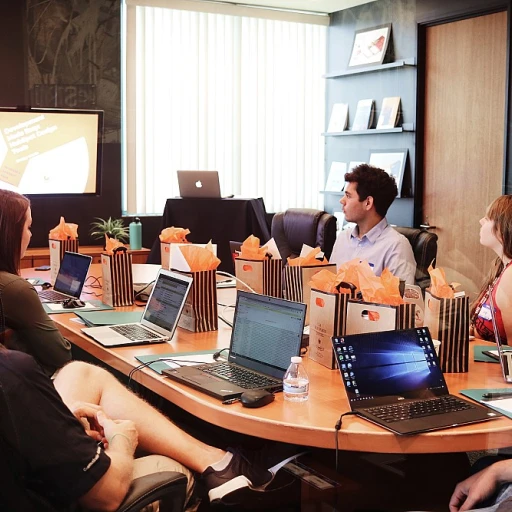
Understanding the Headway in Workforce Dynamics
Exploring Workforce Dynamics Evolution
The modern workforce is undergoing a transformative shift, driven by various dynamics that are reshaping how we view employment and career development. The merging of technology, changing societal expectations, and evolving business needs has propelled this significant headway. As businesses assess the landscape, it’s crucial to understand the underlying trends influencing workforce dynamics today. Recognizing these changes can guide businesses and job seekers in adapting successfully.
Within workforce dynamics evolution, one of the prominent factors is the integration of technological advancements in workplace activities. Many businesses are leveraging new tools and solutions to streamline operations, enhance productivity, and offer innovative services to their customers. This constant technological growth not only changes the nature of specific jobs but also introduces new roles within the market.
In parallel, remote work and flexible arrangements have gained traction due to the changing societal values that prioritize work-life balance. Companies are reimagining their operations to accommodate these preferences. This shift requires careful consideration of fields like human resources, staffing recruiting, and employer record management to ensure compliance with both state and local regulations.
Furthermore, the role of continuous learning becomes apparent as these advancements take place. The workforce must embrace ongoing education to remain relevant in the ever-evolving business environment. This need for continuous development highlights the criticality of providing training and skill development resources.
Inclusion and diversity are also cornerstones in the ongoing transformation of workforce dynamics, as organizations strive to build equitable environments. This involves re-evaluating recruitment and staffing strategies to foster a workplace that reflects varied backgrounds and perspectives.
Navigating through such complex changes requires strategic adjustments in workforce solutions and service delivery. Businesses must build robust support systems to align with their long-term goals. A successful adaptation provides the framework for organizations to maintain competitive advantage amid these shifts.
Technological Advancements and Their Impact
Technological Shifts Transforming Jobs
In recent years, the workforce has seen significant headway in terms of technological advancements, which have drastically impacted the way we work. These changes open doors to new skills for tomorrow's workforce, proving essential for both job seekers and organizations alike. As businesses become more reliant on technology, organizations must adapt accordingly to remain competitive and efficient.
Firstly, the rise of artificial intelligence and automation has led to a shift in the types of jobs available, making it crucial for individuals to acquire new skills and embrace continuous learning. This evolution has influenced various sectors, prompting employers to reassess their staffing and recruitment strategies. North Carolina, with its robust job market and educational resources, serves as an excellent example of how regions are adapting to these shifts.
Furthermore, digital transformation affects workforce management and employer record systems, enabling more streamlined HR processes and staffing solutions. Innovative professional services are emerging to support these transitions, offering tools and services that simplify complexity for businesses aiming to stay ahead.
Organizations must look at workforce solutions that can offer scalable services to navigate this technological landscape efficiently. By understanding these dynamics and employing strategic resources, businesses can harness technological advancements to create long-term career opportunities and strengthen their workforce management.
Remote Work and Flexible Arrangements
Balancing Flexibility and Productivity
Remote work has undeniably transformed workforce management, offering solutions to a myriad of challenges businesses face today. The emergence of remote and flexible arrangements has been a significant headway in the modern work dynamics, providing job seekers with opportunities that transcend geographical barriers. However, this transition requires a strategic balance to ensure productivity and employee well-being. Companies exploring remote work options must bolster their support systems to meet their workforce needs effectively. This involves investing in advanced communication tools and creating comprehensive strategies to optimize workforce solutions. As businesses adapt to this shift, implementing robust staffing recruiting approaches and sustaining career development amid this flexible work environment remains vital.Remote Work: A Catalyst for Change
The substantial rise in remote tasks and flexible work arrangements is reshaping the job market across various states, including North Carolina. In Raleigh, several professional services firms have expanded their headquarters to accommodate the increasing demand for remote staffing services. This expansion not only facilitates job creation but also encourages innovative human resources practices to thrive. Remote work offers businesses the latitude to harness diverse talent pools. This also requires companies to navigate privacy policy concerns diligently, as the safe exchange of resources and information remains pivotal. Developing directories for remote positions, promoting open roles through job registration events, and fostering inclusive professional services are key components of sustaining remote workforce engagement.Integrating Technology and Human Connection
Despite the benefits of remote work, it is imperative that businesses do not neglect the essential human connection component. Regular virtual interactive events and large collaborative projects can help maintain team cohesion. Additionally, companies may require funding to bolster their communication and support infrastructures, ensuring a seamless transition for employees shifting to remote tasks. Moreover, it is crucial for organizations to advocate for long-term career growth and continuous learning within these flexible work structures, understanding the role of workforce solutions in adapting to future business needs. Businesses that effectively integrate technological advancements with human-centered approaches will not only thrive in the current landscape but will also pave the way for their workforce to join the careers of tomorrow effectively.The Importance of Continuous Learning
Embracing Lifelong Learning for Workforce Success
In the rapidly evolving landscape of work, continuous learning has become a cornerstone for both individuals and organizations aiming to stay competitive. As technological advancements reshape jobs and create new opportunities, the ability to adapt and acquire new skills is more crucial than ever.
For job seekers and professionals, the path to career advancement is increasingly tied to their willingness to engage in lifelong learning. This involves not only acquiring new technical skills but also developing soft skills that are essential in a dynamic work environment. Employers are recognizing this need and are investing in workforce solutions that support ongoing education and training.
Organizations are implementing various strategies to foster a culture of continuous learning:
- Offering Flexible Learning Opportunities: Businesses are providing access to online courses, workshops, and seminars that employees can join at their convenience. This flexibility is key in accommodating diverse learning styles and schedules.
- Creating Personalized Learning Paths: By leveraging data and analytics, companies can tailor learning experiences to meet the specific needs of their workforce, ensuring that training is relevant and impactful.
- Encouraging Peer-to-Peer Learning: Facilitating knowledge sharing among employees through mentorship programs and collaborative projects can enhance learning and foster a sense of community.
- Investing in Professional Development: Supporting employees in attending industry events, conferences, and other learning opportunities can help them stay abreast of the latest trends and innovations.
In North Carolina, for instance, state and local initiatives are providing funding and resources to support workforce development, recognizing the importance of equipping individuals with the skills needed for the jobs of tomorrow. This is particularly relevant in areas like Raleigh, where the demand for skilled professionals in sectors such as technology and professional services is on the rise.
Ultimately, the organizations that prioritize continuous learning will be better positioned to navigate the challenges of the future workforce. By fostering an environment that values education and growth, businesses can not only enhance their staffing and recruitment efforts but also ensure long-term success in an ever-changing market.
Diversity and Inclusion in the Future Workforce
Promoting Uniqueness in Workplace Environments
The concept of providing fair opportunities in the workforce is shaping the future of employment worldwide. An increasing awareness of the relevance of diversity and inclusion is becoming pivotal in driving the success of organizations. Leveraging various cultural, gender, and ethnic backgrounds can lead to groundbreaking solutions, innovation, and even better job satisfaction. The employment landscape is witnessing transformative change, emphasizing the need for mixed teams. Inclusive practices stimulate creativity by merging diverse perspectives and problem-solving methods. Businesses are recognizing that embracing these tactics not only enhances their services headway but also fosters a more compassionate workspace. For job seekers, joining a workforce where diversity flourishes can offer enriching, long-term career paths. It’s about establishing environments where employees feel valued regardless of their differences. Further applying this in meetings, strategy discussions, and staffing recruiting processes ensures cohesion within organizations. ### Building an Inclusive Culture at State and Local Levels The action towards inclusion should also incorporate cultural integration within state local entities. Registration for events that celebrate variety in the workforce is becoming commonplace as more companies recognize the importance of incorporating diverse perspectives. Raleigh, known for its innovative approaches in professional services, exemplifies a community striving for inclusion. With an aim at evolving human resources strategies, Raleigh-based businesses focus on workplace management solutions tailored to diverse workforce needs. Collaborative efforts between companies and recruitment staffing services help kickstart initiatives that are comprehensive and support underrepresented groups. ### Strategies to Foster Diversity While creating inclusive environments, businesses need tailored strategies to ensure workforce solutions are effectively applied.- Diverse Hiring Practices: It starts with recruitment staffing, where employers use diverse advertising channels and implement targeted outreach programs to attract potential employees from multiple backgrounds.
- Support Structures: Establishing mentoring programs, affinity groups, and diversity councils at headquarters Raleigh and beyond, providing resources and support systems for continuous growth.
- Privacy Policies: Developing transparent policies that protect employee information and ensure an inclusive culture is critical.
Strategies for Organizations to Adapt
Strategizing for a Robust Workforce Future
As organizations wrestle with the shifting landscape of the workforce, it becomes imperative to devise sound strategies to stay ahead. The evolution calls for an adaptable approach, integrating technological advancements, remote work, and continuous learning to address the dynamic market. To thrive in the future workforce, businesses need to prioritize several key strategies:- Embrace Flexible Work Arrangements: Given the rise of remote work, it’s crucial for companies to create policies that support flexibility. This not only meets employee expectations but also opens up a wider talent pool, as location becomes less of a constraint.
- Invest in Technological Integrations: The adoption of new technologies is paramount. From AI-driven recruitment staffing to advanced workforce management tools, leveraging technology can enhance efficiency and reduce costs.
- Foster a Culture of Continuous Learning: As job requirements evolve, providing resources for skill development helps employees stay relevant. Partnering with professional services for training programs can strengthen this aspect.
- Commit to Diversity and Inclusion: Integrating diversity into the workforce isn't only a social imperative; it’s also a business strategy. It encourages varied perspectives, fostering innovation and resilience.
- Leverage Workforce Solutions: Utilizing modern workforce solutions can help streamline the hiring process and improve productivity. Headquarters in Raleigh and other large hubs offer comprehensive services to address these needs.
- Maintain Compliance and Privacy Standards: With increasing data concerns, state and local regulations need strict adherence. A comprehensive privacy policy safeguards both the organization and employees, ensuring trust and compliance.













